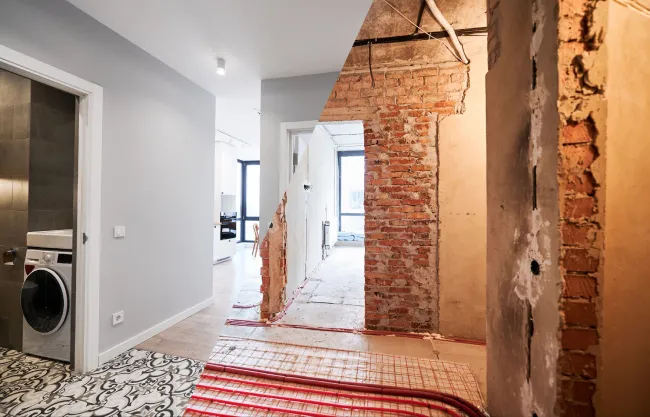Both residential and commercial real estate rentals are in demand. You could hunt for a quality, cash-producing investment that suits your specifications to profit from this market demand. However, building an investment property from the ground up yields notable benefits. For example, new-construction properties typically have fewer repair and maintenance needs than older buildings. This supports enhanced profitability. Because the property has new features and current design elements, it may be more appealing to prospective tenants. This appeal can positively impact profitability as well.
Construction loans differ considerably from the traditional loans that you may be familiar with. A greater understanding of what these loans are and how they work is important. What should you know as you prepare to apply for your new loan?
What Is a Construction Loan?
A construction loan is specifically used to finance the costs of a new construction project. These include the materials, labor and other associated costs to develop the property. This type of financing is often confused with a renovation loan. A renovation loan covers similar expenses for updating an existing structure. These are both short-term loans that remain in place long enough for the work to be completed. They must be replaced with permanent financing once the work is done.
Construction loans differ from long-term traditional mortgages in many ways. These include their purpose, terms, interest rates, qualifications and requirements. In addition, they differ in their collateral. Both traditional and construction loans are collateralized by the land and all of its improvements.
However, a loan cannot be secured by improvements that are not already in place. As a result, construction financing may be secured by the land if the owner has equity in it. However, some applicants buy the land or lot with a loan and have minimal equity. Because of this important difference in collateral, construction loans are riskier to the lender. This higher risk results in higher interest rates. Construction financing also has stricter underwriting guidelines.
How Do Construction Loans Work?
The approved loan amount is based on the cost of labor, materials and other related construction costs. However, the loan amount for construction financing may or may not cover the cost of the land. The down payment requirement for construction financing can vary based on multiple factors. The applicant’s equity in the land can also be used to cover some or all of the down payment.
The construction loan funds are not released all at once as is true for a traditional mortgage. Instead, the funds are released in stages as the project progresses. For example, one stage may be the completion of the foundation. Another stage may be the framing. These releases are referred to as draws. At the completion of each stage, an inspector will sign off on the work so that the next stage in the project can be released. Once all construction work is completed, a final inspection is performed. Upon passing that inspection, you will receive a certificate of occupancy. This marks the end of the construction project. The construction loan must be replaced with permanent financing at this time or the property must be sold.
Types of Construction Loans
The two main types of construction financing are a construction only loan and a construction to permanent loan. A construction only loan requires the applicant to apply for a permanent loan separately. This means that you would have a full loan application process and a set of closing costs for the initial financing. You would also need to apply separately for the permanent loan. The permanent loan comes with its own timeline and set of closing costs.
A construction to permanent loan, on the other hand, has one application and one closing. You will not need to pay closing costs twice as a result. With this type of financing, the construction loan automatically converts to a permanent loan once the construction is completed.
While having one closing and fewer closing costs seems advantageous, there are pros and cons to both types of loans.
Construction Loan Rates and Terms
Depending on the scope of the project, construction is traditionally completed in 12 to 18 months. However, the process may extend beyond this at times. As a result, the financing term is typically between 18 to 24 months. If an extension is needed, the lender must review the circumstances and approve an extension request on a case-by-case basis. Unexpected circumstances and delays are common with construction projects. Consult with your builder and loan representatives for guidance in this area.
As is true with traditional loans, the interest rates for construction financing are based on market conditions. Other factors impacting rates are the applicant’s credit scores and financial strength, the scope of the project and other related factors. Currently, interest rates for construction financing are between 9.5% to 11.99%. However, rates change frequently. Our team at Macoy Capital is happy to provide the current rates upon request.
When building a property, the applicant is responsible for making monthly payments on the financing. While the interest rate will be higher than with a traditional loan, the monthly payment on construction financing is based only on the amount of funding released at the time the payment is due. As a result, your monthly payments will gradually increase over the construction period and until a permanent loan is in place. On the plus side, these loans may be available with interest-only payments.
Construction Loan Closing Costs
Closing costs for construction loans range from 3% to 5% of the loan amount. These costs typically include processing fees, title insurance, legal, appraisal and other closing costs. Your loan representative can provide an estimate of closing costs for your project.
How to Get a Construction Loan
Before applying for your new loan, a few steps are necessary. You should hire a general contractor or a home builder. These professionals or companies must meet the state’s licensing and insurance requirements. Their credentials will be carefully reviewed by underwriting prior to loan approval. Your builder or contractor will prepare a timeline for the construction period. A detailed cost and materials estimate to build the home or investment property is also required. The list of project costs and timeline are necessary when applying for a construction loan. This is because they directly impact the loan amount and term length.
Because these loans are not secured by the developed property, underwriting heavily analyzes the applicant’s credit score and financials. Credit approval is typically based on a score of 680 or higher. In addition to supporting personal documentation and if applicable, underwriting will review the entity’s credentials and documents.
Learn More Today
Macoy Capital supports investors with specialized financing solutions for their real estate plans. Our team is available to answer your questions about construction financing options. We will guide you through the lending process. To learn more about construction loans, contact us today.







